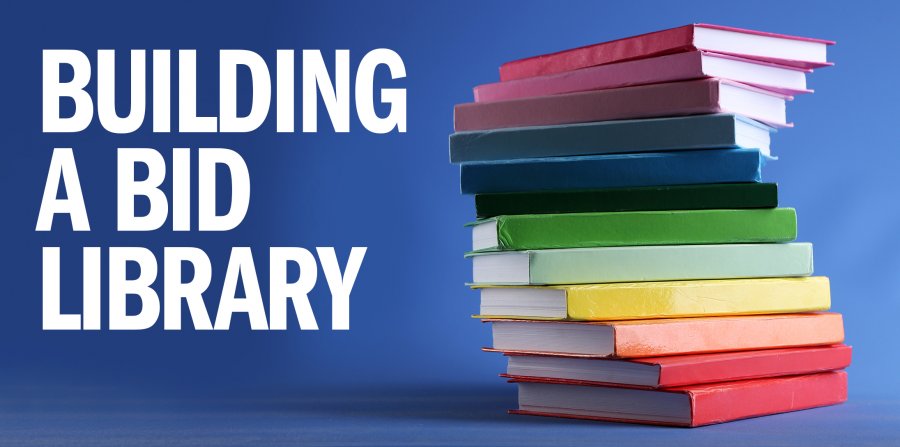When creating a response to an Invitation to Tender or other type of Bid Questionnaire, information is needed about many aspects of your business, from financials and your team structure through to quality assurance systems and the social value of your organisation. This information is rarely in one place and is not often the responsibility of just one person or even one department. As a result, for effective big management, if you are going to be tendering for contracts on a regular or even ad-hoc basis, creating and maintaining a bid library is something you can do to significantly reduce time and effort on the mundane parts, so you can focus more on producing the highest quality tender responses.
Based on the typical questions asked as part of nearly every tender, it is a good idea to keep the following key information in your bid library:
Standard company information
Often referred to as the ‘boilerplate’ information about your company, and generally used at the Selection Questionnaire (SQ) stage, is the standard information that you will need time and time again. Storing this in a template or central location is the first step in creating the bid library. This includes items such as company registration number, VAT number, DUNS number, registered address, PSC details (if applicable), parent company details etc.
Accounts
The last 2 or 3 years of business accounts are nearly always asked for in a tender. This is so the buyer/commissioning authority can establish how financially stable you are, before awarding you a contract. If you are a small business, you don’t need audited accounts, but you might need evidence of turnover, profit and loss, assets and liabilities etc. Make sure you keep these documents in a central location easily accessible by the bid writer/team. When the new accounts are available, update the folder.
Insurances
Insurance details are also often required. Again, make sure you store the certificates in a central location, and monitor their expiration dates. You don’t want to find they’ve just expired and then having to chase around to find new details, or even purchasing a new premium the day before a tender submission.
References and testimonials
Almost every tender requires references covering previous similar work undertaken. It’s important that the references cover similar work, so maintaining a number of references, not just the 3 usually requested is good practice. Make sure all aspects of the goods or services you provide are covered and of course, ensure the named contacts are happy to be contacted by potential buyers. It’s a good idea to give your referee’s a heads up about a tender you’ve used their name in – as its likely they will be contacted in due course. Testimonials are a great source of evidence for bids, so ask your clients for testimonials too.
Policies and procedures
Tenders often request copies of policies or procedures be uploaded with the bid, so make sure these are included in your bid library. This is a good opportunity to make sure they are current too and reflect the latest legislation, guidance and best practice. Most will need to be within a 12 month update cycle, so check if you think some of yours have not been reviewed for years?
Complete Tenders can provide you with a full list of typical policies and procedures you’re likely to need to win a contact in your business sector – just ask.
Accreditations
Keep details of your industry specific accreditations, qualifications and certificates up to date and in your bid library. These could be for the business as a whole e.g. ISO9001 accreditation, or for members of your staff e.g. accredited NICEIC engineer that may need to be included in your next tender.
Staff CVs/experience overviews
Many bids ask for details of the staff who will be managing or working on the contract. Ask the staff you’ll be naming (within GDPR) in bids to write a couple of paragraphs about their specific previous experience. Buyers will want to see why your proposed team are the best people for the contract. Bear in mind this may need tweaking between different bids depending on the focus of the bid. Consider creating a simple CV template and ask staff to complete it. Review them as a whole for consistency.
Quality responses
A key part of a tender is, of course, your responses to quality questions or method statements and so these should form a large part of your bid library. Whilst naturally the questions vary between tenders, there do tend to be common topics that buyers are concerned with and often similarity between new tender questions and ones you might have answered previously. It is a lot easier to write a response to a new question if you have something to build on, rather than a blank page! This is particularly true if you know that your previous response scored 10/10. Organising the responses by topic will help you find what you’re looking for.
As your bid library grows you may find you need some sort of indexing system, but simply using appropriately named folders and search facilities will be more than adequate at least to start. You may also find it helpful to note which tender/buyer the quality response was used for when storing it in the appropriately named folder. If you know the score that the response was given, and any feedback received from the previous buyer, include that too.
Bid library maintenance
A good bid library is a living, growing entity. It’s never ‘finished’, but continually updating and strengthening. Your quality responses (and therein your chances of winning new contracts) will improve over time as you incorporate feedback from buyers, learn the lessons of past responses and build better ones. If you’ve put a response into your library and then receive feedback on how it could be improved – store that feedback with the response, so when you come to use it again, you can incorporate the feedback.
Make sure you also keep a copy of any additional information used in a bid, such as reports, images, flow diagrams, evidence of KPIs, SLAs, plans etc, – if one buyer asked for it, the chances are high that another buyer will also ask for it at some stage.
If you would like support with your bid management or help getting your bid library set up get in touch. You can call us on 01707 244713 or email us at info@completetenders.com and one of our Bid Managers will call you back.




